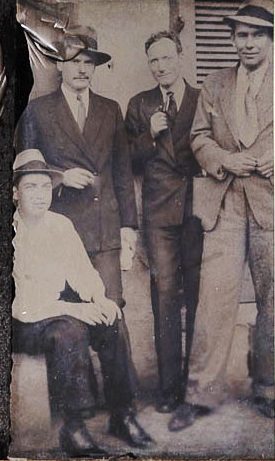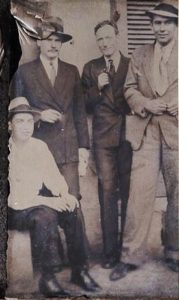Robert Penn Warren
Poet, critic, novelist, and US Poet Laureate Robert Penn Warren is best known for his novel "All The King's Men", inspired by the life and death of Louisiana governor Huey Long.

Courtesy of The Historic New Orleans Collection
Robert Penn Warren with others. Unidentified
Poet, critic, novelist, and U.S. Poet Laureate Robert Penn Warren is best known for his novel, All The King’s Men, inspired by the life and death of Louisiana Governor Huey Long. A native of Kentucky, Warren served on the faculty of the Louisiana State University (LSU) English department between 1934 and 1942. Along with Cleanth Brooks, a fellow faculty member, Warren founded The Southern Review, a critically acclaimed literary journal that rose to national prominence. While at LSU, Brooks and Warren also helped establish a movement within literary criticism commonly referred to as New Criticism.
Early Life
Born April 24, 1905, in Guthrie, Kentucky, Robert Penn Warren was the oldest of three children born to Robert Franklin Warren, a banker, and Anna Ruth Penn Warren, a schoolteacher. After growing up on a tobacco farm, Warren entered Vanderbilt University at the precocious age of sixteen. There he associated with a group of southern writers known as the Southern Agrarians—including John Crowe Ransom and Allen Tate—and contributed an essay to their anti-industrialism manifesto, I’ll Take My Stand. Like the Agrarians, Warren played a prominent role in the Southern Renaissance, an outpouring of literature by southern writers between World War I and the end of World War II. Many of his early poems appeared in The Fugitive, a magazine published at Vanderbilt during the mid-1920s.
Warren went on to earn a master’s degree in English literature from the University of California, Berkeley, in 1927. After briefly attending Yale University, he entered New College at Oxford as a Rhodes Scholar, receiving his B.Litt. in the spring of 1930. In 1929, he married Emma Brescia. After teaching at several colleges and universities, Warren arrived at LSU in 1934.
Years at LSU
LSU recruited Warren as part of a campaign—initiated by Huey Long—to expand the university and enhance its reputation by bringing nationally known scholars to its faculty. While at the university, Warren frequently collaborated with fellow Kentuckian Cleanth Brooks. After founding The Southern Review, a literary quarterly, they served as its managing editors and published works by renowned literary figures including Eudora Welty, T. S. Eliot, Wallace Stevens, and Katharine Anne Porter. Time magazine hailed the journal as “superior to any other in the English language.”
In addition, Warren and Brooks collaborated on several influential text books: An Approach to Literature, published in 1936; Understanding Poetry, published in 1938; Understanding Fiction, published in 1943, after Warren’s departure from LSU; and Modern Rhetoric, published in 1949. With these books, Warren and Brooks helped develop New Criticism, a methodology for the study of literature that dominated mid-twentieth-century American and English literary criticism. New Critics advocated close readings of literary texts, rejecting the use of extratextual sources such as biography and history as tools for understanding literature. Also during his LSU period, Warren published several works of poetry, including Thirty-Six Poems (1936) and Eleven Poems on the Same Theme (1942). In addition, he worked on a play, Proud Flesh, which became the basis for All The King’s Men, published in 1946. All the King’s Men told the story of a southern demagogue, Willie Stark, who amassed tremendous power before being assassinated by a political foe. The similarities between the novel’s protagonist and Long were obvious, and Warren was at LSU in 1935 when a bullet ended the governor’s rise to power. Circumspect about how Long’s story influenced All The King’s Men, Warren said only that if he had not gone to Louisiana, “the novel never would have been written.” After winning the Pulitzer Prize in 1947, the book was adapted for film in both 1949 and 2006; Warren adapted it for the stage in 1960.
Significance and Achievements
In 1941, LSU officials announced plans to cease publication of The Southern Review, citing budget concerns. Shortly thereafter, the University of Minnesota offered Warren a full professorship with an annual salary of $4,000. When LSU failed to match the offer, proposing a salary of $3,800 instead, Warren resigned and took the post in Minnesota. In the 1950s, he joined the faculty at Yale University as an instructor of playwriting, a position he would hold until his retirement from academia. His first marriage ended in divorce in 1951, and Warren married Eleanor Clark, with whom he had two children.
Warren served as U.S. Poet Laureate in 1944–45 and won the Pulitzer Prize two more times: in 1957 for Promises: Poems, 1954–1956, and in 1978 for Now and Then: Poems, 1976–1978. To date, he is the only writer to have won the Pulitzer for both poetry and prose. In addition to All the King’s Men, Warren published nine other novels. He also interviewed civil rights leaders and workers for the 1965 book, Who Speaks for the Negro? In this book, Warren reversed his earlier position and advocated racial integration. In 1974, the National Endowment for the Humanities selected Warren to give the Jefferson Lecture, the federal government’s highest honor for achievement in the humanities. He died September 15, 1989, in Vermont.
